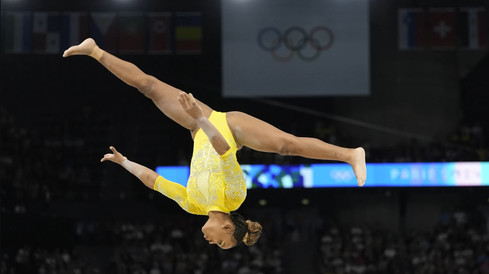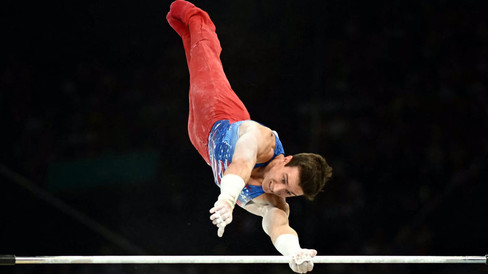The 2024 Summer Olympic Games mark the first time in my life that I have shown substantial interest in any major athletic event. I’m not a sporty person, okay?!
It started in January. I had a co-worker who is a Chiefs superfan, and I felt it was time I learn to be a Chiefs fan. I’ve lived in KC for four years; I’m not going anywhere anytime soon; I should probably be a Chiefs fan. It’s logical!
Well, apparently that mentality carried over to the Olympics this year😆 I’m an American; I believe in a level of patriotism; and I like being the best. It only makes sense that I watch the Olympics!
So I bought the subscription to Peacock. I read articles on the “must watch events.” I made a spreadsheet with events my husband and I wanted to see and at what time they would be live for us. I organized it by date and then chronologically. And then I opened a note on my phone to document and record my thoughts through the whole games.
I was determined to witness as much Olympic prowess as I responsibly could.
I watched men’s rugby, women’s judo, dressage eventing, men’s slalom, men’s volleyball, women’s water polo, women’s street, women’s gymnastics, women’s surfing, men’s gymnastics, women’s breaking, men’s speed climbing, women’s 10m platform diving, men’s breaking, and men’s combined SD bouldering.
And seven pages of notes later, I think the 2024 Paris Summer Olympics changed my life.

It was Day 4, and I was watching men’s canoe slalom when the commentator goes, “While certainly painful, it’s not catastrophic.” She was talking about a bad moment in the competitor’s run, but I found myself captured by how applicable that is to handling all the hard things we find ourselves facing.
Then, on Day 6, I heard the commentators discussing gymnast Brody Malone’s story. Fifteen months ago, Malone fell from the high bar, shattering his knee. He was told it was a career-ending injury. But Malone chose to believe his injury was painful, not catastrophic.
In Paris, he fell twice from the high bar in preliminary rounds. Twice.
But.
He landed his routine in the team finals PERFECTLY. 14.166. It was insane. I may have cried.
Painful, not catastrophic.
March 2023 – Malone destroys his knee during competition
Three surgeries.
Months of bedrest.
Months of crutches.
May 2024 – Wins a U.S. title
July 2024 – Leads the Men’s USA Gymnastics Team to a Bronze medal finish
Painful, not catastrophic.
And he’s not the only one!
Rebeca Andrade, a decorated Brazilian gymnast, tore the same ACL three times in four years. Each tear required reconstruction surgery and a lengthy rehabilitation. She’s gone on to become Simone Biles’ main rival and medal multiple times over in multiple competitions.
Painful, not catastrophic.
Ukrainian bgirl Stefani had a hernia that pinched a nerve and paralyzed half her body a few years ago. She refused surgery, instead risking permanent paralysis to rehab her body. Not only did she compete in the 2024 Paris Olympics, she did it six months postpartum!
Say it with me – painful, not catastrophic.
And then I found out that the United State’s most decorated female Olympian ever, Katie Ledecky, lives with POTS🤯 She talks about her diagnosis, the social implications, and how she lives with the diagnosis in her book, Just Add Water: My Swimming Story. She notes that the diagnosis was painful – it wasn’t in the plan, and it required some significant life changes. “But,” she writes, “it isn’t too much of a burden.”
Painful, not catastrophic.
And of course there is gymnast Suni Lee. Diagnosed with two incurable kidney diseases in February of 2023, she was unable to train until January of this year. She only had a few months to get Olympic ready. From dropping out of college and being bedridden to standing on the podium in a year-and-a-half!
Painful, not catastrophic.
As I witnessed the stories of these victorious injured and disabled and chronically ill Olympians this summer, I began to wonder…how do they do it? And why can’t I??
Little did I know that men’s combined SD bouldering would give me the answer…

Olympic bouldering is a whole different world, so let me give you an overview:
Each boulder is called a “problem.”
There are four problems, each testing a different skill.
The goal is to find a “solution” and make it to the top within five minutes.
The number one rule for this sport is this: get stability before continuing.
We had watched five or six climbers fail the first problem. It was a test of power, and none of the athletes were even close to finding a solution. After the seventh athlete fell off, he dusted his hands off, cleaned chalk off the wall, and stood back, studying the problem.
The commentator goes, “Failure cannot lead to frustration here or there will be no finding a solution. Sometimes, it’s helpful to take a break, especially when your emotions come up.”
That climber became the first to find a solution to this problem.
He went on to place fourth overall FYI.
Pieces began to make sense for me.
When it comes to my health story, in the hardest place, it took me two years to take a step back. I was frustrated, and the commentator was right – I could not find a solution. I also couldn’t figure out how to take a break from the daily problem that was consuming me.
Two years to do what an Olympic athlete does regularly.
Humble myself and take instruction, correction, and advice from someone else.
Two years to do what is second nature for these Olympians.
Take a step back and cope well with my frustration.
The final climber to tackle these problems is much taller than the average competitor. This means the boulders aren’t set for his height. It’s a tremendous disadvantage. And yet. The commentator was so excited to watch him compete! “I’m always curious to see what solutions he finds,” she said. “He makes his height his strength in a place that wasn’t designed for it.”
Talk about a comment on chronic illness and disability!
So how do I live vulnerable and victorious like Biles? How do I work undefeated like Ledecky? How do I overcome like Lee? How do I choose the hard like Malone and Stefani? How do I recover like Andrade, and how do I embrace suffering as painful, not catastrophic?

I wish there was a step-by-step, an easy how-to guide. For my sake and yours! There’s not, but here’s what I do know.
It is a choice.
Choosing the hard thing is central to the mentality of an injured and/or ill Olympic athlete I’ve found.
Choose the walk. The movement. The workout.
Choose the electrolytes, the extra glass of water, the herbal tea.
Choose to set down the donut, the wine, the social media platform.
Choose joy. Choose hope. Choose to feel the pain.
It's a choice that happens over and over and over again. For each of those stories, it was a choice made multiple times a day. Sometimes, every hour.
Choose to rest. Choose to nourish. Choose to believe.
Choose to trust that your body will move as it feels right.
Choose to trust that your body can learn and relearn and unlearn.
Choose to believe you are more than the statistic, the number, the odds.
We don’t have Olympic-sized pools to conquer or floor routines to crush. We don’t have international podiums to top or new sports to represent. And we certainly don’t have the pride of a nation on our backs.
But we do have diagnoses to battle, circumstances to face, and mundane daily responsibilities to steward. We do have grief to manage, disappointment to conquer, and an overwhelmed life to manage. We might have flares to overcome, jobs to complete, and children to wrangle.
Here’s another thing I know, though. The size of your stage doesn’t matter.
Your home is no less important than an international podium. Your work, chosen and called, certainly has more impact than the high-flying flips of an elite gymnast. Your name is a household name in the home that matters most – your own.
You do not have millions of strangers cheering you on – you have something much better. A handful or two of people who love you at your worst, share meals and life around your table in your living room that needs to be vacuumed and dusted, and a community you can call on and count on.
The setbacks are part of life, beloved. We are promised suffering in this life. May we increasingly approach these trials as painful, not catastrophic and find ourselves handling the hard things like Olympic athletes🖤










Comments